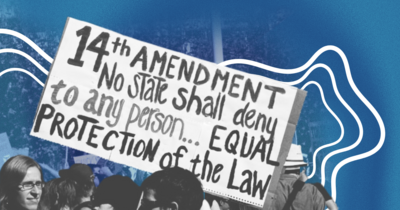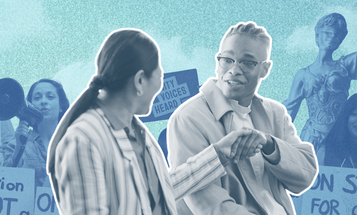
There Has Never Been a Better Year to Mark the Anniversary of the 14th Amendment
This anniversary provides an opportunity for us to reacquaint ourselves with their history and to recommit ourselves to the work of ensuring their enforcement.

On July 9, 1868, South Carolina became the 27th state to ratify the 14th Amendment to the U.S. Constitution. Its vote tipped the ratification tally over the three-quarters-of-states threshold needed to add amendments to the Constitution, and the 14th Amendment became the law of the land.
And yet, on the 157th anniversary of that day, the amendment’s protections have never been as threatened as they are right now. This anniversary provides an opportunity for us to reacquaint ourselves with their history and to recommit ourselves to the work of ensuring their enforcement.
Over the past 157 years, these protections have been widely celebrated but deeply contested.
The 14th Amendment guarantees American citizenship to anyone born in the United States, prevents state governments from depriving any person of “life, liberty, or property” without governmental proceedings, and requires that the law be applied equally to people in similar situations. Over the past 157 years, these protections have been widely celebrated but deeply contested.
The amendment’s citizenship clause nullified the preexisting clause of the Constitution that counted enslaved people as three-fifths of a person when determining congressional representation. It also overturned the Dred Scott decision, which ruled that anyone of African descent was not a U.S. citizen. By extending full citizenship to everyone born in the United States, the amendment radically departed from our nation’s historical pattern of curtailing the most basic freedoms and rights of Black people in order to enrich a white elite.
But the stroke of a pen cannot reweave the fabric of a society. Even after the adoption of the 14th Amendment, a wide range of laws and practices have been used to deny Black Americans the rights conferred by their citizenship, such as the right to run for elected office, to be free of forced labor, to receive a prompt and fair trial by jury, and to vote in elections. Indigenous Americans born on tribal lands were not granted birthright citizenship until 1924 and were denied voting rights for decades after. In the context of the extreme anti-Asian racism of the 1890s, the U.S. government even argued that the children of Chinese immigrants should not receive birthright citizenship (though the Supreme Court ultimately ruled against this argument).
Though birthright citizenship law had been viewed as well settled, the Trump administration has launched a frontal attack on the right to birthright citizenship (which the Supreme Court has yet to directly address) and is currently exploring ways to strip some Americans of their U.S. citizenship.
The due process clause of the 14th Amendment provides people in the United States with due process protections at the state level. The Fifth Amendment already prohibited the federal government from infringing on people’s lives, liberty, or property without a fair process. Yet, the Constitution was silent on the question of state governments and due process, and following emancipation, Southern states passed laws known as the “Black Codes.” The state-level Black Codes baldly infringed on the freedom of freed Black people in the South, forcing them into labor contracts under the threat of arrest, prohibiting them from buying and selling real estate, and forbidding marriage between Black and white people, all without due process.
Yet, despite the amendment’s due process clause, states continue to take people’s freedom and property without adequate legal process today.
The due process clause of the 14th Amendment intended to overturn the Black Codes, ensure states gave all people due process, and allow free Black Southerners to flourish. Yet, despite the amendment’s due process clause, states continue to take people’s freedom and property without adequate legal process today. For example, through a process known as “civil asset forfeiture,” states seize and sell property that is merely alleged to be involved in a crime. Under Operation Lone Star, the state of Texas has jailed migrants for months without filing charges or providing access to legal counsel, presaging the 2025 federal deportations of immigrants and removal of young citizens with almost no process at all.
Finally, the equal protection clause prohibits states from “deny[ing] to any person within its jurisdiction the equal protection of the laws.” After introducing this language, Senator Jacob Howard explained, “It prohibits the hanging of a black man for a crime for which the white man is not to be hanged. It protects the black man in his fundamental rights as a citizen with the same shield which it throws over the white man.” While court interpretations of the 14th Amendment have expanded the equal protection clause’s coverage beyond race, these protections have fallen short of protecting all people with Senator Howard’s metaphorical shield. Redlining practices extracted wealth from Black neighborhoods, schools are more racially segregated today than they were when Brown v. Board was decided, and the courts have reinterpreted the 14th Amendment to block protections for racial minority groups that level the playing field.
While expressly passed to protect Black Americans, an exploited group, today the equal protection clause is being used to consolidate the privilege and power of those who already benefit from both
The evolution of legal structures of the United States is characterized by a pull between protecting the least privileged and conferring more power on the most privileged. While expressly passed to protect Black Americans, an exploited group, today the equal protection clause is being used to consolidate the privilege and power of those who already benefit from both, from banning affirmative action to denying health care access for transgender youth.
Never in living memory have the protections of the 14th Amendment been so threatened as they are today. Yet, history is instructive. Legal protections are not physical laws that automatically govern social life once enacted. They are part of our social world. They shape society, and they also interact with the broader social context to privilege and punish according to the mores of the time. Historian Eric Foner notes the continued failure of the 14th Amendment to live up to its egalitarian promises and writes, “One day, in a different political climate, [the amendment’s power] may yet be awakened, and its power employed to implement in new ways the Reconstruction vision of equal citizenship for all.”
Looking to our past, we can see that the United States may emerge from this period of repression not only with a well-enforced 14th Amendment but new, more expansive rights for its people.
Historical examples show that the United States is no stranger to the violation of fundamental rights by its government. It also shows that when the government overreaches, people in the United States react not just by resisting the oppressive government actions but by demanding and winning new legal structures that grant better and more freedom. The power of organized people is the most effective tool there is to demand and win change in the face of oppressive government. Already today, grassroots actors, communities, and civil society are engaged in this work. Looking to our past, we can see that the United States may emerge from this period of repression not only with a well-enforced 14th Amendment but new, more expansive rights for its people.




